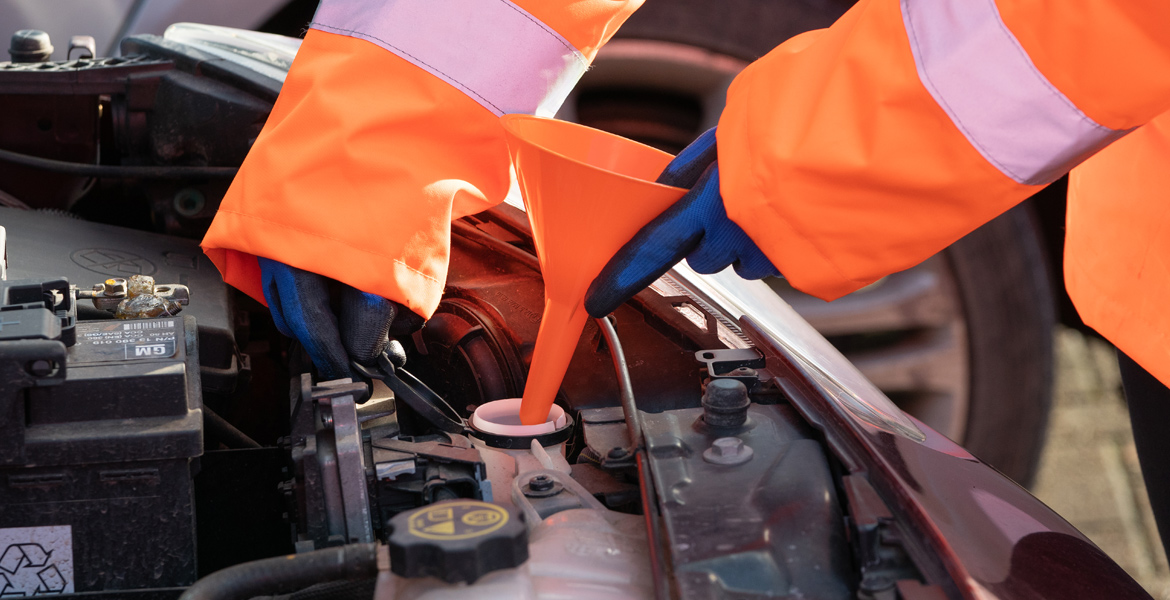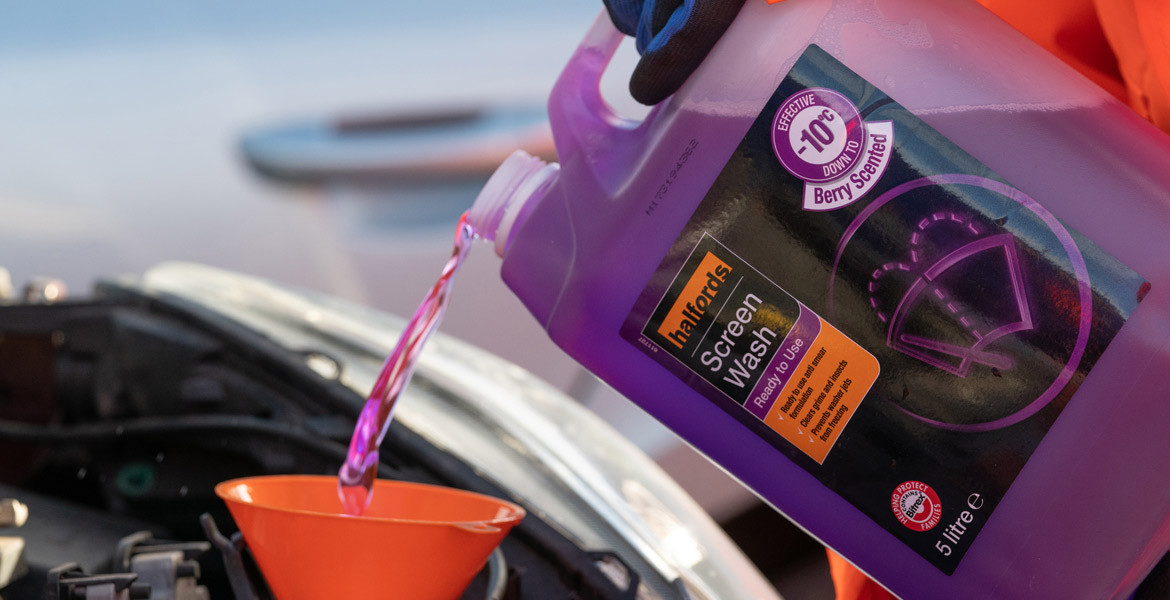Financial Resources
Generating returns for our shareholders through effective management of our financial resources
Group revenue in FY19, at £1,138.6m, was up 0.3% and comprised Retail revenue of £977.2m and Autocentres revenue of £161.4m.
£1,138.6m
Group Revenue
£62.2m
Underlying Group EBIT
24.5p
Underlying Basic EPS
 This icon is used to indicate content on the outputs of the business model.
This icon is used to indicate content on the outputs of the business model.

Loraine Woodhouse
Chief Financial Officer
Reportable Segments
Halfords Group operates through two reportable business segments:
- Retail, operating in both the UK and Republic of Ireland; and
- Autocentres, operating solely in the UK.
All references to Retail represent the consolidation of the Halfords ("Halfords Retail") and Cycle Republic businesses, Boardman Bikes Limited and Boardman International Limited (together, "Boardman Bikes"), and Performance Cycling Limited (together, "Tredz and Wheelies") trading entities. All references to Group represent the consolidation of the Retail and Autocentres segments.
The FY19 accounting period represents trading for the 52 weeks to 29 March 2019 (the "financial year"). The comparative period FY18 represents trading for the 52 weeks to 30 March 2018 (the "prior year").
Group Financial Results
| FY19
£m | FY18
£m | Change |
|---|
| Group Revenue | 1,138.6 | 1,135.1 | 0.3% |
| Group Gross Profit | 579.0 | 570.2 | 1.5% |
| Underlying EBIT* | 62.2 | 74.6 | -16.6% |
| Underlying EBITDA* | 98.2 | 109.5 | -10.3% |
| Net Finance Costs before non-underlying items | (3.4) | (3.0) | 13.3% |
| Underlying Profit Before Tax* | 58.8 | 71.6 | -17.9% |
| Profit Before Tax | 51.0 | 67.1 | -24.0% |
| Underlying Basic Earnings per Share* | 24.5p | 29.6p | -17.2% |
* Our Annual Report and Accounts includes Alternative Performance Measures (APMs) which we believe provide readers with important additional information on the Group. A glossary of terms and reconciliation to IFRS amounts is included in the Glossary of Alternative Performance Measures.

Group revenue in FY19, at £1,138.6m, was up 0.3% and comprised Retail revenue of £977.2m and Autocentres revenue of £161.4m. This compared to FY18 Group revenue of £1,135.1m, which comprised Retail revenue of £977.2m and Autocentres revenue of £157.9m. Group gross profit at £579.0m (FY18: £570.2m) represented 50.9% of Group revenue (FY18: 50.2%), reflecting an increase in the Retail gross margin of 60 basis points ("bps") to 48.0% and an increase in the Autocentres gross margin of 50 bps to 68.0%.
Total operating expenses before non-underlying items, increased to £516.8m (FY18: £495.6m) of which Retail comprised £410.5m (FY18: £391.0m), Autocentres £104.2m (FY18: £102.5m) and unallocated costs £2.1m (FY18: £2.1m). Total operating expenses increased to £524.6m (FY18 £500.4m). Unallocated costs represent amortisation charges in respect of intangible assets acquired through business combinations, namely the acquisition of Autocentres in February 2010, Boardman Bikes in June 2014, and Tredz and Wheelies in May 2016, which arise on consolidation of the Group.
Group Underlying EBITDA decreased 10.3% to £98.2m (FY18: £109.5m), whilst net finance costs before non-underlying items were £3.4m (FY18: £3.0m).
Underlying Profit Before Tax for the year was down 17.9% at £58.8m (FY18: £71.6m). Net non-underlying items of £7.8m in the year (FY18: £4.5m) related predominantly to organisational restructure and strategy review costs. After non-underlying items, Group Profit Before Tax was £51.0m (FY18: £67.1m).
Retail
| FY19
£m | FY18
£m | Change |
|---|
| Revenue | 977.2 | 977.2 | – |
| Gross Profit | 469.3 | 463.6 | 1.2% |
| Gross Margin | 48.0% | 47.4% | |
| Operating Costs | (410.5) | (391.0) | 5.0% |
| Underlying EBIT* | 58.8 | 72.6 | -19.0% |
| Non-underlying items | (8.7) | (4.8) | |
| EBIT after non-underlying items | 50.1 | 67.8 | -26.1% |
| Underlying EBITDA* | 87.1 | 99.0 | -12.0% |
* Our Annual Report and Accounts includes Alternative Performance Measures (APMs) which we believe provide readers with important additional information on the Group. A glossary of terms and reconciliation to IFRS amounts is included in the Glossary of Alternative Performance Measures.
Revenue for the Retail business of £977.2m reflected, on a constant-currency basis, a like-for-like ("LFL") sales increase of 0.8%. Non-LFL revenue in the year included the contribution from Cycle Republic stores that have been open for less than 12 months.
Please refer to the Retail Operational Review in the Chief Executive's Statement for further commentary on the trading performance in the year. Like-for-like revenues and total sales revenue mix for the Retail business are split by category below:
| FY19
LFL (%) | FY19
Total sales
mix (%) | FY18
Total sales
mix (%) |
|---|
| Motoring | -0.4% | 60.4 | 61.0 |
| Car Maintenance | -1.1% | 31.0 | 31.6 |
| Car Enhancement | -0.6% | 18.0 | 18.2 |
| Travel Solutions | +1.7% | 11.4 | 11.2 |
| Cycling | +2.6% | 39.6 | 39.0 |
Gross profit for the Retail business at £469.3m (FY18: £463.6m) represented 48.0% of sales, 60bps up on the prior year (FY18: 47.4%). This improvement reflected several factors including a positive FX tailwind, stock loss improvements and a continued focus on buying efficiencies. These were partially offset by the softer motoring sales growth in the year.
The table below shows the average exchange rate reflected in cost of sales, along with the year-on-year movement.
| | FY19
full-year
$ | FY18
full-year
$ |
|---|
| Average USD: GBP rate reflected in cost of sales | | $1.32 | $1.29 |
| Year-on-year movement in rate | | $0.03 | $(0.18) |
Retail operating costs increased by 5.0% to £410.5m. The full-year cost increase comprised of the following: 1) inflationary impacts and 2) strategic investment for the future growth and sustainability of the business. These costs were partially offset by a reduction in incentive payments year-on-year.
Autocentres
| FY19
£m | FY18
£m | Change |
|---|
| Revenue | 161.4 | 157.9 | 2.2% |
| Gross Profit | 109.7 | 106.6 | 2.9% |
| Gross Margin | 68.0% | 67.5% | |
| Operating Costs | (104.2) | (102.5) | 1.7% |
| Underlying EBIT* | 5.5 | 4.1 | 34.1% |
| Non-underlying items | 0.9 | – | 100% |
| EBIT after non-underlying items | 6.4 | 4.1 | 56.1% |
| Underlying EBITDA* | 11.1 | 10.5 | 5.7% |
* Our Annual Report and Accounts includes Alternative Performance Measures (APMs) which we believe provide readers with important additional information on the Group. A glossary of terms and reconciliation to IFRS amounts is included in the Glossary of Alternative Performance Measures.
Autocentres generated total revenues of £161.4m (FY18: £157.9m), an increase of 2.2% on the prior year with a LFL* increase of 2.6%.
The sales performance reflected growth in tyres, MOT and servicing sales. Gross profit at £109.7m (FY18: £106.6m) represented a gross margin of 68.0%; an increase of 50 bps on the prior year.
Autocentres' Underlying EBITDA of £11.1m (FY18: £10.5m) was 5.7% higher than FY18, and Underlying EBIT was £1.4m (34.1%) higher than FY18 at £5.5m (FY18: £4.1m).
Portfolio Management
The Retail store portfolio at 29 March 2019 comprised 477 stores (end of FY18: 480).
The following table outlines the changes in the Retail store portfolio over the year:
| Number |
|---|
| Relocations | 2 |
| Leases re-negotiated | 19 |
| Rightsized | 0 |
| Openings | 3 |
| Closed | 7 |
The focus in year was on re-laying stores to enhance the space allocated to growing categories rather than on refreshing the Retail store environment.
Two Autocentres were opened in the year and one was closed, taking the total number of Autocentre locations to 317 as at 29 March 2019 (end of FY18: 316). 8 Autocentres were refreshed in the year (FY18: 6).
With the exception of eight long leasehold and two freehold properties within Autocentres, the Group's operating sites are occupied under operating leases, the majority of which are on standard lease terms, typically with a 5 to 15-year term at inception and with an average lease length of just less than 6 years.
Net Non-Underlying items
The following table outlines the components of the non-underlying items recognised in the year:
| FY19
£m | FY18
£m |
|---|
| Organisational restructure costs | 6.8 | 4.3 |
| Group-wide strategic review | 2.4 | – |
| One-off royalty income | (1.6) | – |
| Acquisition and investment related fees | 0.2 | 0.2 |
| Operating lease obligation | – | (0.3) |
| Net non-underlying operating costs | 7.8 | 4.8 |
| Acquisition related interest (credit)/charge | – | (0.3) |
| Net non-underlying items | 7.8 | 4.5 |
In the current and prior year, separate and unrelated organisational restructuring activities were undertaken. These comprised:
- redundancy costs of £1.5m relating to roles which will not be replaced; and
- £5.3m of asset write-offs, principally resulting from the strategic decision to re-platform the Retail and Autocentres websites.
Costs in the prior period comprised:
- redundancy costs of £0.7m relating to roles which will not be replaced;
- £1.0m provision for compensation to the new CEO, on joining, for foregoing entitlements from a previous employer, as outlined at the time of announcement of his appointment;
- £1.5m in relation to a restructure of the Boardman business. Boardman has stopped selling directly to customers through the Boardman website. The website will be maintained as a 'brand' website, with customers being directed to purchase bikes predominantly through Cycle Republic; and
- £1.1m in relation to asset write-offs, principally resulting from the decision to close the marketplace offer on Halfords.com.
Costs of £2.4m were incurred in the current period in relation to the costs of preparing the new Group strategy, which comprised of the following:
- £2.0m of external consultant costs; and
- £0.4m warehouse and distribution costs in order to align our network with the new strategy.
A one-off royalty income of £1.6m was received in the current period in relation to the use of a software licence.
Explanations of the remaining non-underlying items are included in Note 5 to the financial statements later in this report.

Finance Expense
The net finance expense (before non-underlying items) for the year was £3.4m (FY18: £3.0m). The interest costs on bank borrowings have increased since the previous year, reflecting an increase in the Bank of England base rate.
Taxation
The taxation charge on profit for the financial year was £9.1m (FY18: £12.4m), including a £1.4m credit (FY18: £0.8m credit) in respect of non-underlying items. The effective tax rate of 17.8% (FY18: 18.5%) differs from the UK corporation tax rate (19%) as a result of the effects of non-deductible depreciation charged on capital expenditure, the impact of accounting for employee share options and adjustments in respect of prior years.
Earnings Per Share ("EPS")
Underlying Basic EPS was 24.5 pence and after non-underlying items 21.2 pence (FY18: 29.6 pence, 27.8 pence after non-underlying items), a 17.2% and 23.7% decrease on the prior year. Basic weighted-average shares in issue during the year were 197.1m (FY18: 197.0m).
Dividend
The Board has proposed a final dividend of 12.39 pence per share (FY18: 12.03 pence), taking the full-year ordinary dividend to 18.57 pence per share, an increase of 3%. If approved, the final dividend will be paid on 30 August 2019 to shareholders on the register at the close of business on 26 July 2019.
Capital Expenditure and Investments
Capital investment in the year totalled £31.0m (FY18: £37.3m) comprising £26.3m in Retail and £4.7m in Autocentres.
Within Retail, £11.4m (FY18: £12.8m) was invested in stores, including store relocations and re-organisation, and the opening of three Cycle Republic stores. Additional investments in Retail infrastructure included a £10.5m investment in IT systems, including development of the till hardware and a software upgrade. The balance of £4.4m was invested in warehousing and logistics upgrades and Tredz & Wheelies.
The £4.7m (FY18: £7.0m) capital expenditure in Autocentres principally related to the replacement of garage equipment and fixtures and fittings, the development of new till hardware and software and the growth of Halfords Mobile Expert.
On a cash basis, total capital expenditure in the year was £29.4m (FY18: £37.0m).
The investment held in Tyres On The Drive of £8.1m was derecognised during the year and accounted through the Statement of Other Comprehensive Income.
Inventories
Group inventory held as at the year-end was £185.4m (FY18: £195.5m). Retail inventory decreased to £184.0m (FY18: £194.1m), reflecting working capital efficiencies.
Autocentres' inventory was £1.4m (FY18: £1.4m). The Autocentres business model is such that only modest levels of inventory are held within the Centres, with most parts being acquired on an as-needed basis.
Cashflow and Borrowings
Adjusted Operating Cash Flow was £88.5m (FY18: £95.4m). After taxation, capital expenditure and net finance costs, Free Cash Flow of £42.7m (FY18: £41.5m) was generated in the year. Group Net Debt was £81.8m (FY18: £87.8m), with the Underlying EBITDA ratio at 0.8:1.
Brexit and impact of movements in foreign currency exchange rates
At the date of finalising this report there is considerable uncertainty as to how and even whether, the UK will exit from the EU. There is corresponding uncertainty around the impact on Halfords.
- Impact on exchange rates. The Group buys a significant proportion of its goods in US dollars; between $200m and $300m a year. As previously guided, the majority of our US dollar sourcing is for cycling products.
- Prolonged uncertainty over exit terms and continued weakness in Sterling could lead to a slowdown in the UK economy and, consequently, a further weakening of consumer confidence, impacting trading conditions for the Group. Working groups have been held throughout the year to identify, assess and implement mitigations for the risks of a hard Brexit. However, Halfords has strong positions in fragmented motoring and cycling markets, and a service-led offer that differentiates us from our competitors, both physical and online.
Principal Risks and Uncertainties
The Board considers the assessment of risk assessment and the identification of mitigating actions and internal control to be fundamental to achieving Halfords' strategic corporate objectives. In the Annual Report and Accounts, the Board sets out what it considers to be the principal commercial and financial risks to achieving the Group's objectives. The main areas of potential risk and uncertainty in the balance of the financial year are described in the Strategic Report of the 2019 Annual Report and Accounts. These include:
- Capability and capacity to effect significant levels of business change
- Stakeholder support and confidence in strategy
- Sustainable business model
- Product, Service Quality and Brand Reputation
- Brand appeal and market share
- Service Quality
- Critical physical infrastructure failure (including supply chain disruption)
- Information Technology Systems and Infrastructure
- Cyber and data security
- IT Infrastructure failure
- Skills shortage
- Staff engagement / culture
- Economic, Environmental and Political
- Change in Government policy or regulation
- Brexit
Specific risks associated with performance include Christmas trading as well as weather-sensitive sales, particularly within the Car Maintenance and Cycling categories in the Retail business.
Loraine Woodhouse
Chief Financial Officer
21 May 2019